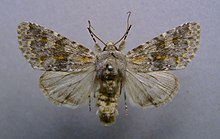The large ranunculus (Polymixis flavicincta) is a moth of the family Noctuidae. It is found in Europe and North Africa.
| Polymixis flavicincta | |
|---|---|

| |

| |
| Scientific classification | |
| Domain: | Eukaryota |
| Kingdom: | Animalia |
| Phylum: | Arthropoda |
| Class: | Insecta |
| Order: | Lepidoptera |
| Superfamily: | Noctuoidea |
| Family: | Noctuidae |
| Genus: | Polymixis |
| Species: | P. flavicincta
|
| Binomial name | |
| Polymixis flavicincta (Denis & Schiffermüller, 1775)
| |
| Synonyms | |
| |

Technical description and variation
editA. flavicincta F. (= flavicincta-major Esp., dysodea Esp. nec Hbn.) (33 c, d). Forewing pale grey speckled with darker olive grey, especially in median area; the edges of the stigmata, the course of the basal and submarginal lines, and vein 1 marked by orange scales; lines dark olive; upper stigmata paler; the claviform darker; median shade distinct; hindwing grey, darker in female, with veins, cell spot, outer line, and submarginal shade darker; the species varies in depth of colour; the darker forms are known as ab. meridionalis Bsd. (33 d) from Spain and Corsica; — calvescens Bsd. (33 d) [ Polymixis rufocincta calvescens (Boisduval, 1840) ] on the other hand is a pale grey form with the yellow scaling , all but obsolete, occurring in S. France, Italy, and Sicily; ab. albescens ab. nov. (33 d) is dull white, without grey dusting except in median area, the upper stigmata also whitish; hindwing paler. Larva pale bluish green, with a darker dorsal vessel and broad pale spiracular stripe; head green. [1] The wingspan is 40–50 mm. The length of the forewings is 17–22 mm.
Biology
editThe moth flies in one generation from the end of August to November [1] and are attracted to light.
The larvae feed on various grasses, such as mint, Taraxacum officinale, Senecio, Fireweed and at times even fruit bearing trees.
Subspecies
edit- Polymixis flavicincta flavicincta
- Polymixis flavicincta meridionalis (Boisduval, 1840) (Corsica,...)
- Polymixis flavicincta lajonquierei Boursin, 1963 (Spain,...)
- Polymixis flavicincta caroli Plante, 1975 (Algeria,...)
- Polymixis flavicincta laportei Plante, 1975 (Morocco,...)
Notes
edit- ^ The flight season refers to Belgium and the Netherlands. This may vary in other parts of the range.
References
edit- ^ Warren. W. in Seitz, A. Ed., 1914 Die Großschmetterlinge der Erde, Verlag Alfred Kernen, Stuttgart Band 3: Abt. 1, Die Großschmetterlinge des palaearktischen Faunengebietes, Die palaearktischen eulenartigen Nachtfalter, 1914 This article incorporates text from this source, which is in the public domain.
External links
edit